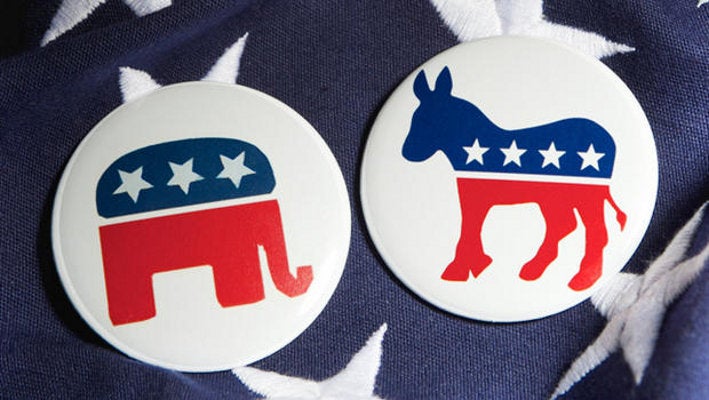
“Terrorism” in the Republican and Democratic Platforms: What are the Implications?
Near the end of his speech at the Democratic National Convention, former President Bill Clinton stated, “If you’re a Muslim and you love America and freedom and you hate terror, stay here and help us win and make a future together, we want you.”
Peter Beinart responded quickly and emphatically in The Atlantic, arguing, “Whether Clinton meant to or not, he lapsed into Trumpism: the implication that Muslims are a class apart, deserving of special scrutiny and surveillance, guilty of terrorist sympathies until proven innocent.”
But “Trumpism” as Beinart defines it is not exactly a new phenomenon. Politicians, pundits and policy wonks across the political spectrum link terrorism to Islam and its adherents. We analyzed the Democratic and Republican platforms’ uses of “terror” and found that it’s often linked to Islam.
The RNC & DNC Platforms: A Side-by-Side Analysis
A word search of the keyword “terror”[1] showed 25 results for the RNC and 22 for the DNC.
The descriptive adjectives that immediately preceded the word “terror” varied. The RNC platform tends to employ explicit, religiously coded adjectives like “Islamist,” “Islamic” and “radical Islamic” when describing terrorism and it unequivocally exemplifies terrorism using a specific community “ Muslims. This is especially confusing, since they specifically reference three terrorist groups by name, not only Hezbollah and the Taliban, but also FARC, the Marxist-Leninist armed guerilla group that has waged war in Colombia for half a century. In addition, it also referenced “domestic terror,” but was unclear about which group or ideology they were referring to. Lack of clarity about America’s domestic threat is particularly ironic since in a 2015 report by the Triangle Center on Terrorism and Homeland Security, 74% of the law enforcement agencies it surveyed reported domestic anti-government extremism as one of the top three perceived terrorist threats in their respective jurisdictions. (In contrast, 39% listed extremism connected with terrorist organizations like al Qaeda.) In addition, a 2015 Department of Homeland Security intelligence report, in conjunction with the FBI, warned of the threat of violent attacks perpetrated by “sovereign citizen extremists.” According to the report, there have been 24 such attacks across the U.S. since 2010 alone. These sorts of attacks, however, were not referenced explicitly in the platform.
The DNC platform emphasized “international” or “global” terrorism. In so doing, it appears to characterize “terror” internationally. Yet the examples of terror they identify cite only professedly Muslim groups “ ISIS, Hamas, Hezbollah, Boko Haram, al-Shabaab and AQIM. Since 16 out of 22 of these references were located in a subsection called “Confronting Global Threats,” one would expect that other non-Muslim extremist groups would be identified.
What are the implications?
While the messaging of both platforms on terrorism may appear markedly different, both link terrorism with Islam. And as some have argued, the word “terrorism,” even when unaccompanied by an Islamic adjective, implies that the source of terror is Islam and its perpetrators are Muslim. When Muslims are associated with violence and terrorism so frequently, it’s bound to have consequences.
The 2016 presidential election, of which the RNC and DNC platforms are part, has become notorious for its divisiveness and vitriol against Muslims, in addition to other minority groups. Particularly, from March 2015 “ when the first candidate announced his presidential campaign “ to March 2016, the Bridge Initiative observed an alarming increase in violence against Muslims in the United States. Notably, at least three separate incidents of violence were perpetrated by public supporters of Republican presidential nominee Donald Trump. The Southern Poverty Law Center has also observed a 42% increase in the number anti-Muslim hate groups since 2014.
As the election cycle continues, both parties would do well to revisit, and revise, their messaging to ensure that this ongoing couching of “terrorism” in explicitly “Islamic” language doesn’t further contribute to a climate that has already had violent repercussions for American Muslims and those perceived to be Muslim. For Democrats, the urgency for such a revision cannot be understated especially as political analysts argue that Democrats now carry the new mantle of the “national security party.” For Republicans, paying attention to a climate in which its policies and rhetoric on terrorism lapse into various shades and degrees of “Trumpism” is also a critical issue.
[1] “Terror” was used as the keyword to include variations of the word, such as “terrorism,” “terrorist,” “counterterrorism,” etc.

 Search
Search